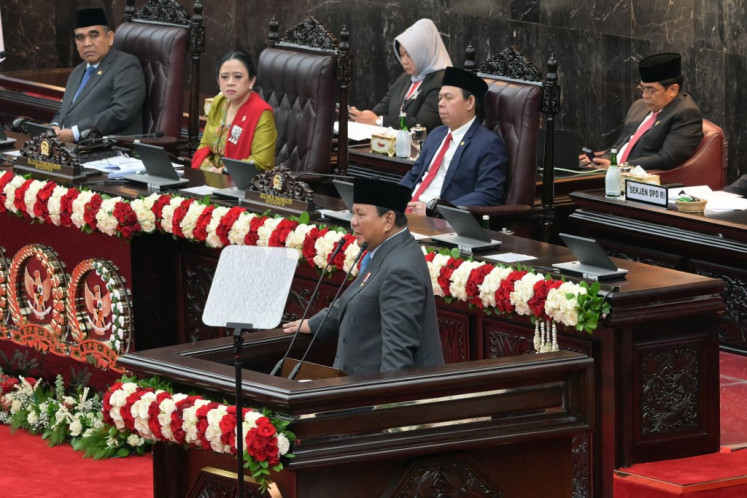Popular Reads
Top Results
Can't find what you're looking for?
View all search resultsPopular Reads
Top Results
Can't find what you're looking for?
View all search resultsTerror — new buzz word in Indonesian horror films
Scare fest: Perempuan Tanah Jahanam, marketed internationally under the title Impetigore, attracted more than 500,000 moviegoers in the first days of its release in Indonesia
Change text size
Gift Premium Articles
to Anyone
S
care fest: Perempuan Tanah Jahanam, marketed internationally under the title Impetigore, attracted more than 500,000 moviegoers in the first days of its release in Indonesia.(Courtesy of Rapi Films)
Hello fear, goodbye jump scare. The dominance of the horror genre in Indonesian filmmaking looks set to last as filmmakers appeal to a deeper sense of terror in a discerning audience.
Indonesian horror is primarily known for its plethora of ghastly ghosts and supernatural mysticism, mirroring old beliefs deeply rooted in people until today — hence the high viewership despite lukewarm appraisal from critics over flaws in the storytelling department or poor execution.
But Joko Anwar’s latest scare-fest, Perempuan Tanah Jahanam (Impetigore), switches it up a bit.
In the setting of a remote Javanese village, Maya (Tara Basro) and her friend Dini (Marissa Anita) search for fragments of the former’s past after a near-death experience in the big city. Little do they know that the village holds a terrible affliction and its denizens will stop at nothing to lift the curse.
At first glance, Perempuan Tanah Jahanam — which was envisioned a decade ago — bears the hallmarks of traditional Indonesian horror: a cursed protagonist, an eerie village in the middle of nowhere and some creepy little girls whose existence hints at a bigger evil.
But as the minutes roll, the typical jump scares never arrive, and the stringy-haired ghostly women are kept at a minimum. Instead, the general atmosphere is made more ominous and disturbing, something Joko intended right from the beginning.
“The difference between Pengabdi Setan (Satan’s Slave) and Perempuan Tanah Jahanam is that, though they are both horror movies, the former is purely supernatural horror, whereas this one is a mix with atmospheric horror and psychological horror,” he said after a press screening on Oct. 10.
At 4.2 million viewers, Joko’s Pengabdi Setan, a remake of the 1980 film, was the most-watched Indonesian title of 2017. The number did not include the moviegoers overseas where it screened. The movie was also a success with critics, winning seven categories at the Citra Awards out of 13 nominations.
An avid horror fan himself, Joko found horror movies more technical, as they require more precision than other genres. However, most Indonesian horror titles suffered from a poor script, often relying too much on ghostly figures.
“[The scenario] often comes across as if the constant presence of the ghost will be sufficient. However, Indonesian horror fans are very critical, and they will look for the story and plot instead of the ghosts,” Joko says. “Hopefully with Perempuan Tanah Jahanam, instead of a jump scare every five minutes, it’ll be enough to send shivers down your spine.”
Based on data from filmindonesia.or.id, horror movies often score big in cinemas. As of early October, four horror-related titles are currently in the top-15 most viewed movies of 2019, with three having attracted more than 1 million viewers.
Perempuan Tanah Jahanam had gathered over 500,000 viewers on the first four days of screening since Oct. 18.
Danur 3: Sunyaruri is currently the most-watched horror of the year at 1,854,835 viewers, trailed by Kuntilanak 2 at 1,726,570 viewers. The titles are currently number five and six respectively on this year’s list, with their prequels hitting the million-viewer mark easily as well.
Next to be released on Nov. 7 would be the reboot of 1981 cult classic Ratu Ilmu Hitam. Helmed by Kimo Stamboel (Macabre, Dread Out) and based on the newly written script by Joko, the film will differ from the original version, which had the international titles The Queen of Black Magic for the United States release and La Reine de la Magie Noire for the France release in 1983.
While the focus of the original was on the titular character played by the Indonesian queen of horror movies, the late Suzanna, Kimo and Joko took a new creative direction by focusing on three urban families stuck in a house where they have to deal with black magic terror upon terror.
Promising a spine-spindling joy ride, Kimo said the new film would bear his signature of keeping the viewers on edge with a splash of humor to hit them when they least expect it.
“I would like to elevate the [horror] genre itself. People are quite demanding for a quality film, one which is not made with too many jump scares, no character development and no storytelling. Hopefully, I could fill the gap with this film,” he said in a recent interview during a press tour to The Jakarta Post. “Watching [Ratu Ilmu Hitam] you will feel a different kind of terror.”
The cast and crew, who gave their all to meet the high expectations vested in the film, reluctantly shared some unexplainable incidents that happened on the set — an old house in Cirebon, West Java, as not to take away the importance of the film.
“This film is not a ghost story,” said actress Hannah Al-Rashid firmly. “It’s a very good, grounded story about families trying to get out of a terrifying situation.”
Another member of the cast, Imelda Therinne, said the movie was timely, as it reflected the life of urban people today, and current filmmaking technology made the technically difficult execution possible.
“The original film is iconic and still relevant to today’s viewers. The reboot, however, is made based on extensive research and creative direction that could stand on its own. It’s a different kind of horror film, a progressive one.” she said.
The impetus for a new take on Indonesian horror also came from filmmaker Putrama Tuta (A Man Called Ahok) who initiated a joint effort with other filmmakers under The United Team of Art (TUTA Lab). The first batch of the project includes five horror films depicting mystical stories from different regions in Indonesia.
“This project will provide investment and supervision to early-stage film production to improve the standards of film premise, script and proposal to be developed as an original or adapted screenplay. Hopefully this collaboration will increase people’s trust in Indonesian films of this genre,” he said.










